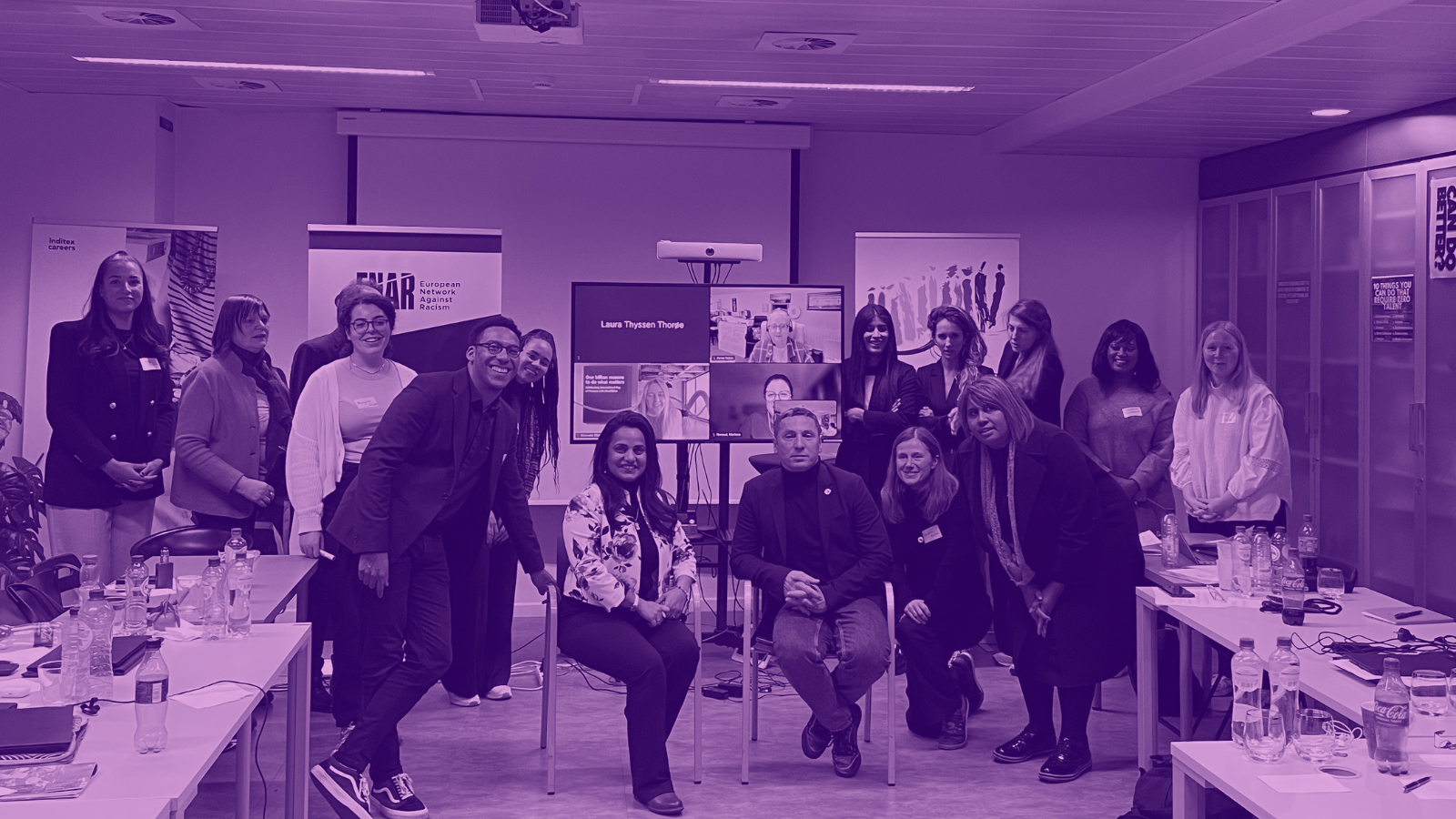
13th annual Equal@Work seminar: Building bridges for an anti-racism society: exploring the role of employers
The 13th Equal@Work annual seminar took place on 9 December 2022. Hosted by Inditex in their Brussels offices, the seminar focused on solidarity and movement building between stakeholders seeking to progress from “allyship to coalition” against racism.
Kim Smouter, ENAR Director General, made opening remarks with words on creating lasting systemic change in society despite the growing polarisation that is increasing existing vulnerabilities. He set the scene for the day by reflecting on strengthening the bridges between civil society organisations and the employers that compose the Equal@Work platform. Rachid Bensahnoune and Amélie Simon from Inditex welcomed the participants to the Inditex premises. The participants started engaging through activities designed by Anila Noor, founder of New Women Connectors and facilitator of the gathering.
The morning continued with a thought-provoking keynote speech from Estelle Depris on performative activism and risk-taking to be anti-racist. Estelle is a consultant, trainer and speaker specialising in issues of racial discrimination, intersectionality and whiteness. She also manages an Instagram account @sansblancderien. She started by explaining the difference between individual, interpersonal, institutional and structural racism and how they interconnect to create systemic racism. She scaled down to the labour market by providing some key data about racial discrimination in the workplace: according to a study from the University of Ghent, applicants with Turkish, Ghanaian or Moroccan-sounding names were 30% less likely to be invited to a job interview. Estelle then proceeded to share with participants testimonies from racialised people received on her social media platform of experiences of structural racial injustices, racial pay gaps, harassment, microaggressions and burnout.
The core of her speech focused on defining performative allyship and providing solution-oriented recommendations. According to Estelle, performative allyship:
- Exploits human rights movement for corporate gain;
- Creates an illusion of progress;
- Drowns out the brands actually making a difference; and
- Puts brands at enormous reputational risks.
To foster an environment of real allyship in the workplace, employers must be clear on antiracist expectations of their employees, dedicate resources to educating employees on bias and inequalities in the workplace, focus on building inclusive workplaces, develop coaching skills and be ready for the journey ahead of them.
The keynote speech finished on using individual and collective power and privilege at the service of a cause and that to achieve lasting change, employers and individuals will have to take risks. The risks included, for instance, calling out a manager who said something racist and risking a promotion.
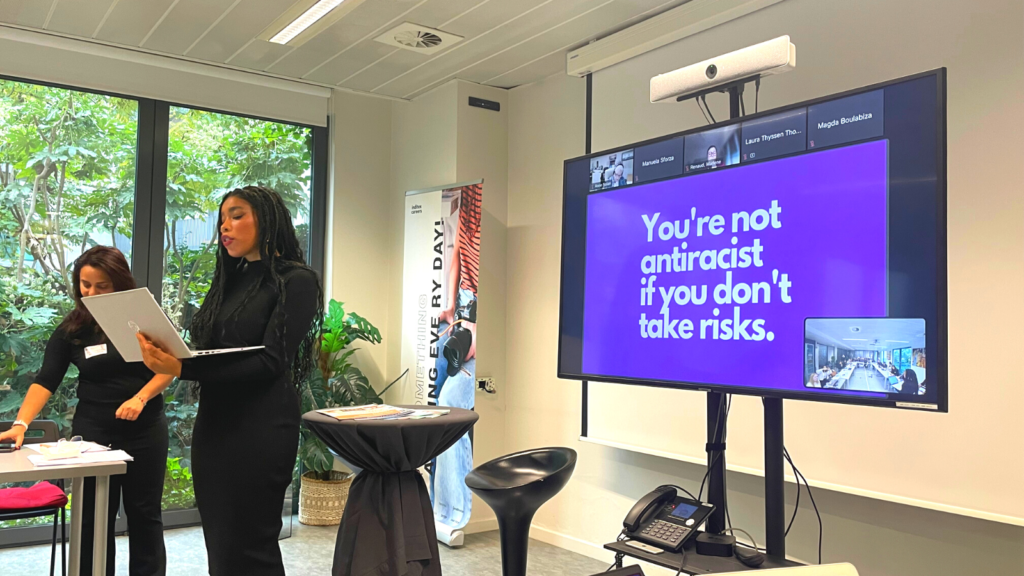
“You’re not antiracist if you don’t take risks.”
Following the speech, participants exchanged on looking productively at whiteness in the corporate sector and civil society organisations. Estelle explained that there are 3 steps to address and understanding racism. The first one is denial, thinking that racism is a thing of the past. However, change only comes when one takes responsibility for the present and the past. The second step is culpability. This is felt due to internalised racism and is followed by shame. When faced with facts about history of racism, white people may feel shame. Then, once this recognition is done, they can face systemic racism. The next step is reparations, when white people are not afraid to be active bystanders, become involved in conversations around racism, aware of power dynamics and practicing radical self-awareness.
After a short break, participants gathered to hear from ENAR members about their needs and expectations from partnering with private sector businesses. Sandrine Gashonga, co-Founder of Letz Rise Up, Juliana Wahlgren, founder of ReVibra, and Anne Nolan, Waterford Integration Services practitioner detailed some of the challenges that the communities they serve are facing.
Anne Nolan talked about the challenges faced by refugees, asylum seekers, and migrants, such as living in a situation where they cannot work or study, the lack of career development and leadership opportunities, and the need for a more holistic approach to make regularisation schemes accessible. Juliana Wahlgren addressed the challenges Latin American women face, including difficulty accessing the labour market, the Eurocentric approach in recruitment, the glass ceiling effect, and cyberbullying/harassment/stalking. Sandrine Gashonga mentioned the housing crisis in Luxembourg, rental discrimination, and the lack of awareness training for staff on anti-racism and microaggressions.
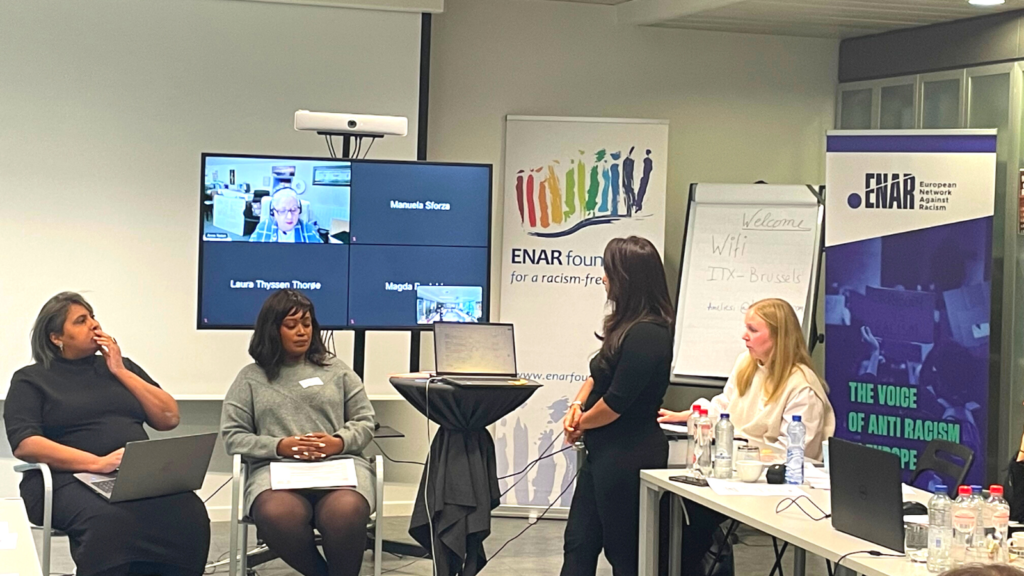
The panellists also discussed how employers and the private sector can contribute to overcoming the challenges they highlighted. Juliana Wahlgren emphasized the need for substantial changes and understanding of permit schemes that affect migrants, while Sandrine Gashonga called for more time for staff to have anti-racism and microaggression awareness training. The panellists agreed that employers need to show a genuine commitment to anti-racism by allowing career development opportunities, supporting underprivileged individuals, and creating safe spaces where people can report discrimination without fear of losing their protection status. They also emphasized the importance of education and awareness-raising, such as educating on historical events to reduce racial biases, investing in anti-racism training, and acknowledging the intersectional nature of discrimination.
ENAR members shared the changes they noticed in anti-racism in the workplace post-2020. Sandrine highlighted that there was increased use of representation as a factor of success of anti-racism policies, without addressing the bigger picture and without concrete commitments and ongoing actions that serve racialised groups. Juliana added that despite the increased interest of big organisations, they have little contact with communities. According to her, there are 3 types of organisations that currently operate: organisations that were already committed to diversity and inclusion before 2020. What changed after 2020 was a motivation to talk about the structural aspect of racism rather than just the interpersonal issue. Secondly, organisations that were not doing anything but wanted to start learning on a superficial level. Finally, organisations that know that the problem exists but are not addressing it.
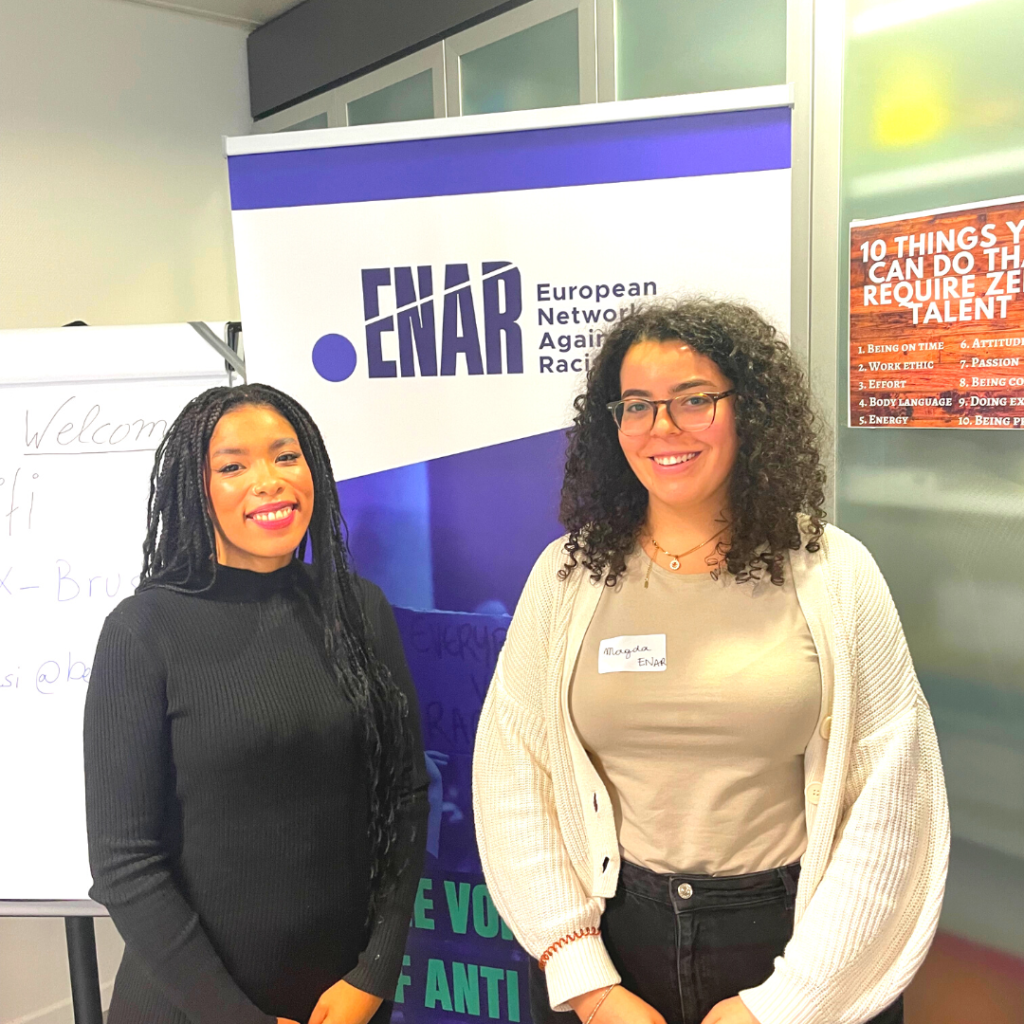
The panellists detailed some of the practices they implement internally in their organisations. Their practices raged from making sure that there is a peer-to-peer model where those who come through the services go on to support providing the services, to dignifying, valuing and rewarding volunteer work, to ensuring a system of representation and leading by example and making sure that the people usually invisibilised get a voice and are included in decision making.
The afternoon was dedicated to workshops where participants contributed to creating a futurist framework for partnerships, thinking about their roles and responsibilities and shaping how they will support anti-racism in utopian or dystopian contexts. They reflected on the impact of their organisations on society. The suggestions ranged from advertising and campaigns to influence society, to ensuring that no discrimination complaints are left ignored and implementing sanction mechanisms.
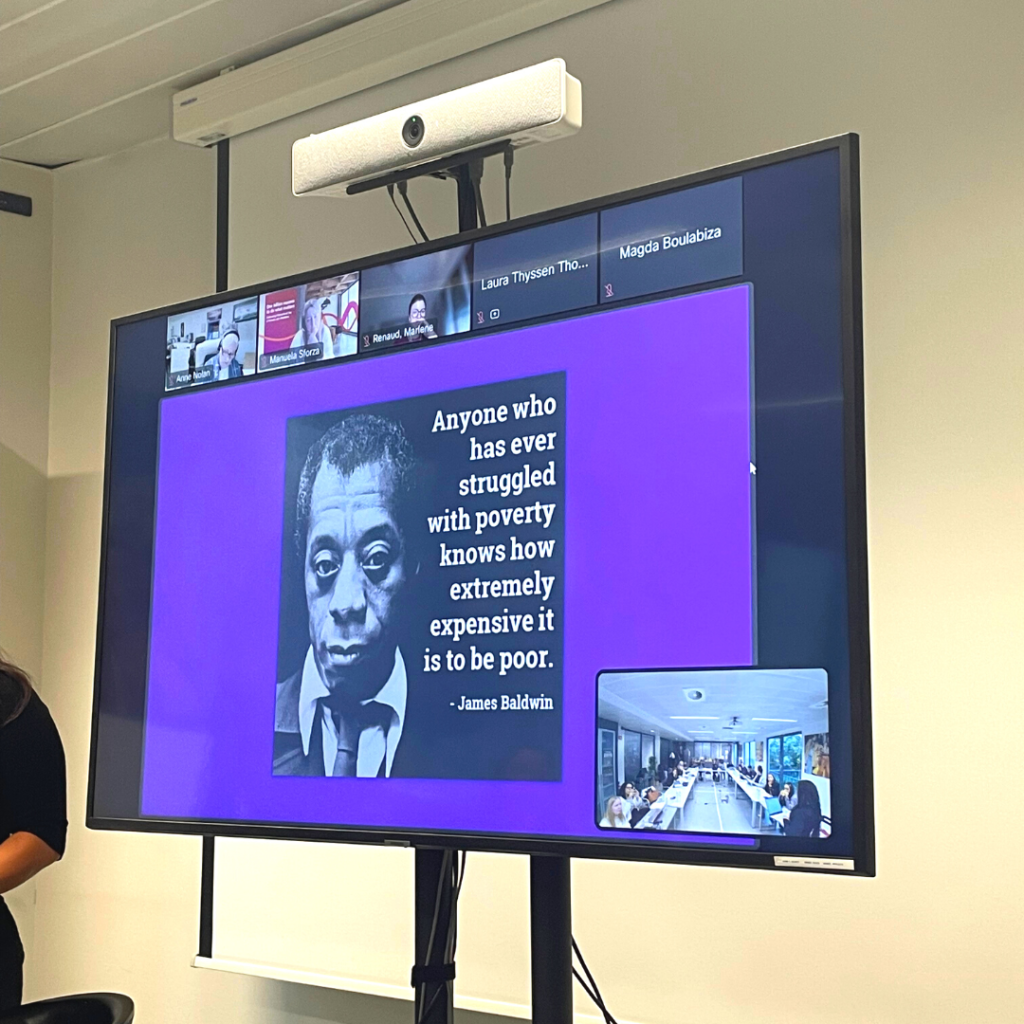
Participants reflected on the actions that should be taken to achieve racial justice through multistakeholder partnerships. They agreed that the activities should focus on boosting participation, data-driven policies, movement building, investing and resource building, education and thought leadership, public commitments and political participation and representation.



